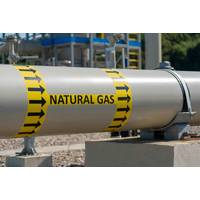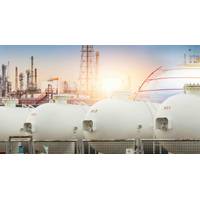
From left to right: Michael Cobb, ExxonMobil; Andrew Scott, Babcock; Ian Lindsay, Babcock; Angus Campbell, BSM; Michael Morrison, Orkney; Gavin Barr, Orkney; Mark Gilks, Calor; and Luca Volta, ExxonMobil (Photo: © Colin Keldie)
Aiming to develop the infrastructure, storage and technical support needed to enable safe liquefied natural gas (LNG) operations for customers in the north of the U.K. and North Sea, including bunkering, partners ExxonMobil, Babcock International Group, Bernhard Schulte Shipmanagement (BSM), Calor and Orkney Islands Council have signed an agreement to collaborate in the Caledonia LNG project.
The parties signed a Memorandum of Understanding (MOU) on November 22 to investigate opportunities to supply LNG for marine and land-based applications.
ExxonMobil will explore the potential for its global marine network to deliver LNG bunker fuel to customers in the region as well as providing technical support and expertise to enable safe bunkering operations. Babcock International Group will provide its experience of storage, handling and distribution of LNG, while BSM would be responsible for supervising the building, management and operation of the marine craft and related assets for the project. Calor will investigate opportunities to supply LNG to industrial and automotive sector customers and Orkney Islands Council will supply port services and security.
“The Memorandum of Understanding is a clear indicator that ExxonMobil, Babcock International Group, Bernhard Schulte Shipmanagement (BSM) and Calor are determined to leverage their history and expertise with LNG to work with Orkney Islands Council to maximize the possibilities for customers,” said Luca Volta, LNG Venture Manager at ExxonMobil Marine Fuels. “We will also draw upon our extensive global marine network to provide our customers in northern UK and the North Sea with LNG bunker fuel.”
The recent decision by the International Maritime Organization (IMO) to implement a global 0.50 percent sulphur cap on vessel emissions in 2020 is likely to increase demand for compliant low-sulphur fuel options, which could include LNG.




